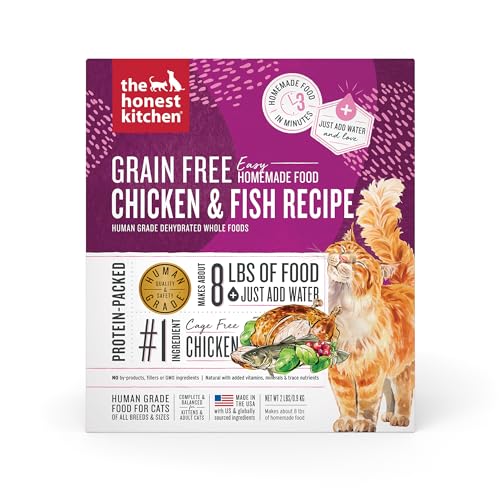
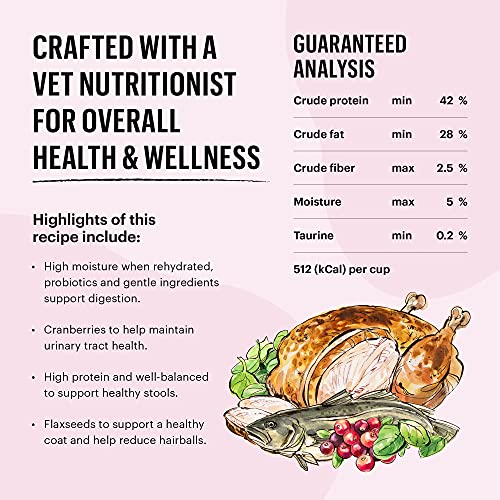
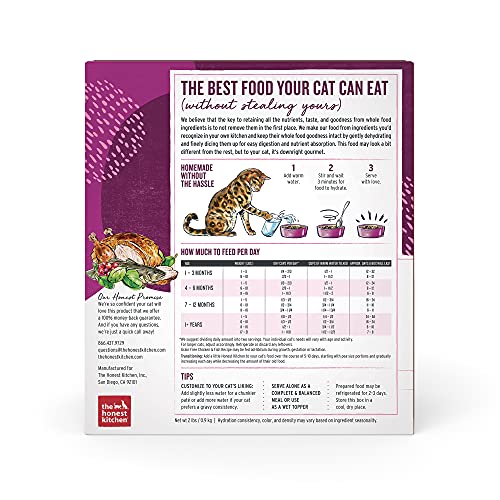
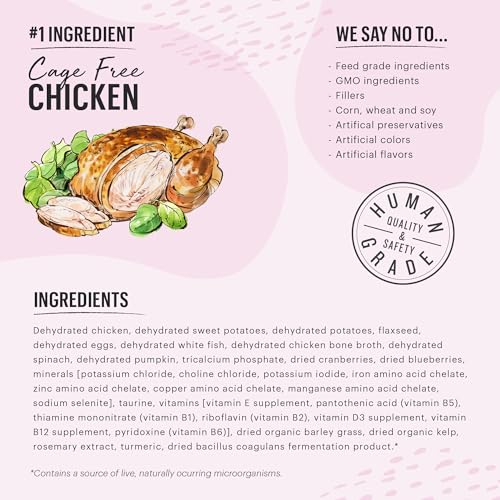
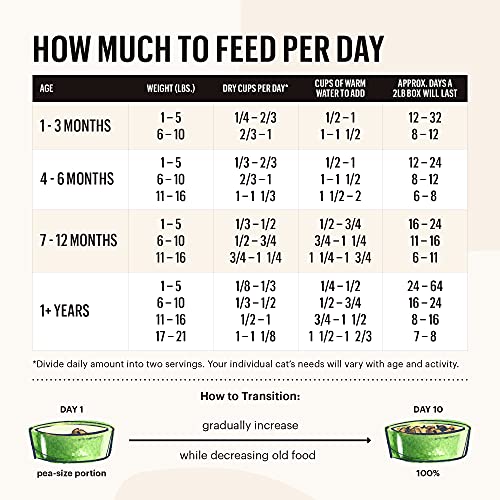
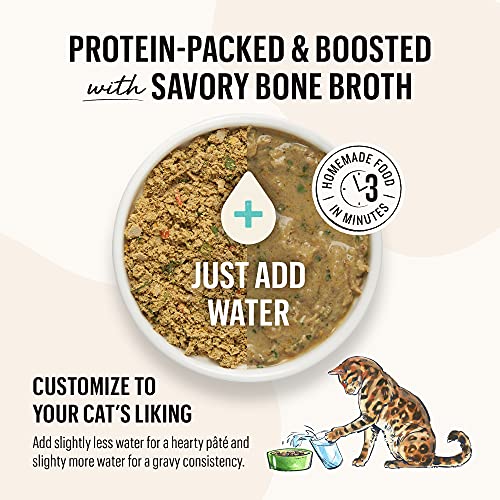
The Honest Kitchen Dehydrated Dog Food - Protein-Rich, Human Grade, Natural Ingredients - 2 lb Box


Vitamin D3
High RiskVitamin D3, also known as cholecalciferol, is a fat-soluble vitamin important for calcium metabolism and bone health. It is synthesized in the skin upon exposure to sunlight and is also found in some foods and supplements. Its primary function is to promote the absorption of calcium and phosphorus in the body.
Sustai Insights
Vitamin D3 offers functional benefits such as supporting bone health and immune function. However, excessive intake can lead to toxicity, presenting risks like hypercalcemia. Environmental concerns include its potential for bioaccumulation. Regulatory bodies impose usage restrictions due to these risks, resulting in a high overall risk assessment. Safe usage practices should be observed, and alternatives such as vitamin D2 may be considered.
Rosmarinus Officinalis (Rosemary) Leaf Extract
Medium RiskRosemary leaf extract is produced from the leaves of the Rosmarinus officinalis plant. It is commonly used in cosmetic formulations for its potential antioxidant properties and fragrance. The extract may also contribute to the preservation of products due to its antimicrobial characteristics.
Sustai Insights
Rosemary leaf extract offers functional benefits such as antioxidant and antimicrobial properties, which can enhance product stability and shelf-life. It is generally considered low risk for carcinogenicity and reproductive toxicity, but it carries a moderate potential for allergic reactions. Environmentally, it poses low risk with no significant pollutant or bioaccumulation concerns. Regulatory bodies have not placed significant restrictions on its use, although some verified products cannot contain certain concentrations. Overall, the ingredient's risk level is medium, necessitating careful usage practices to mitigate allergic responses.
Cyanocobalamin (Vitamin B12)
Low RiskCyanocobalamin, commonly known as vitamin B12, is a water-soluble vitamin essential for red blood cell formation, neurological function, and DNA synthesis. It is utilized in dietary supplements and fortified foods to prevent or treat B12 deficiency, particularly in individuals with limited dietary intake or absorption issues.
Sustai Insights
Cyanocobalamin serves critical physiological functions including energy metabolism and red blood cell production. It is deemed safe with low health risk concerns across various categories such as cancer, allergies, and reproductive toxicity. Environmental impact is minimal, lacking bioaccumulation or significant pollutants. Regulatory bodies, including the FDA, recognize its safety, affirming low risk overall. Recommended usage involves adherence to established dietary allowances, with few noted alternatives. Therefore, the overall assessment indicates low risk.
Tricalcium Phosphate
Low RiskTricalcium phosphate is an inorganic salt composed of calcium and phosphate, commonly used as a dietary supplement and a food additive. It serves as a source of calcium, an anti-caking agent, and a filler in various products.
Sustai Insights
Tricalcium phosphate offers functional benefits as a calcium source, supporting bone health and serving as an effective anti-caking agent in food products. Its environmental impact is low, with no known pollutant potential or bioaccumulation concerns. Health risks are minimal, categorized as low for irritants and allergens, with no significant regulatory warnings. Overall, it presents a low-risk profile for consumers, making it a viable ingredient in various applications.
Potassium Chloride
Low RiskPotassium chloride is an inorganic salt commonly used as a potassium supplement and for its flavor-enhancing properties in food products. It serves as a mineral source and is utilized in various applications, including electrolyte balance in dietary formulations and as a partial substitute for sodium chloride.
Sustai Insights
Potassium chloride offers functional benefits as a potassium source, aiding in electrolyte balance and enhancing flavor. It is generally regarded as low risk, with minimal health concerns regarding carcinogenicity, allergies, or reproductive toxicity. Environmental impacts are also low, with no significant pollutant or bioaccumulation concerns noted. Regulatory bodies, including the FDA, do not impose restrictions on its use. Safe usage is advised to avoid excessive intake. Overall, potassium chloride is considered a safe ingredient with low risk, making it a viable option in various formulations.
Pyridoxine
Low RiskPyridoxine is a substituted aromatic compound, primarily known as vitamin B6. It plays a crucial role in various metabolic processes, including amino acid metabolism, neurotransmitter synthesis, and the production of hemoglobin.
Sustai Insights
Pyridoxine serves essential functions in metabolic processes and is vital for overall health. It poses low health risks, with minimal concerns related to carcinogenicity, allergies, or reproductive toxicity. Environmentally, it is not considered a pollutant or bioaccumulative. Regulatory bodies have not imposed significant restrictions, indicating a low risk overall. Safe usage practices are encouraged, and alternatives like other B vitamins can be considered.
Taurine
Low RiskTaurine is a naturally occurring amino acid primarily found in the brain, heart, and muscles. It plays a crucial role in various physiological processes, including bile salt formation, osmoregulation, and membrane stabilization. Taurine is commonly used in dietary supplements and energy drinks due to its purported benefits in enhancing athletic performance and cognitive function.
Sustai Insights
Taurine exhibits functional benefits such as supporting cardiovascular health and potentially enhancing exercise performance. It poses low health risks, with no significant concerns regarding carcinogenicity, allergies, or reproductive toxicity. Environmentally, taurine is not associated with pollution or bioaccumulation. Regulatory bodies have not issued specific warnings or restrictions. Overall, taurine presents a low-risk profile, making it a relatively safe ingredient in various applications. Safe usage practices should be followed, and alternatives like other amino acids can be considered for specific needs.
Tocopherol, D Alpha
Low RiskTocopherol, specifically d-alpha tocopherol, is a naturally occurring form of Vitamin E. It is commonly used in cosmetic and personal care products primarily for its antioxidant properties, helping to protect formulations from oxidation and extend shelf life.
Sustai Insights
D-alpha tocopherol provides effective antioxidant benefits, contributing to product stability. It is sustainably sourced and generally regarded as safe, with low concerns regarding carcinogenicity, allergies, and reproductive toxicity. However, there are minor concerns about endocrine disruption. Regulatory bodies have not imposed significant restrictions, indicating low overall risk. Recommended usage practices include adhering to established safe concentration thresholds. Alternatives, such as other forms of Vitamin E or plant-based antioxidants, may also be considered.
Potassium Iodide
Low RiskPotassium iodide is an inorganic salt commonly used as a dietary supplement and in pharmaceuticals. It serves various functions, including as a source of iodine, which is essential for thyroid hormone production, and is utilized in certain medical treatments.
Sustai Insights
Potassium iodide provides essential iodine, supporting thyroid health and preventing deficiency. It is generally recognized as safe, with low concerns for carcinogenicity, allergies, and reproductive toxicity. However, it has moderate persistence and bioaccumulation potential in the environment. Regulatory bodies do not impose significant restrictions on its use. Overall, the ingredient is assessed to have a low risk profile, with no major health or environmental concerns, making it a suitable option in its applications.
Riboflavin
Low RiskRiboflavin, also known as Vitamin B2, is a water-soluble vitamin essential for energy production and cellular function. It plays a critical role in the metabolism of fats, carbohydrates, and proteins, and is commonly used as a dietary supplement and food additive for its color and nutritional benefits.
Sustai Insights
Riboflavin offers functional benefits, including its role in energy metabolism and as a food colorant. It is generally recognized as safe with low risk for allergies, carcinogenicity, and reproductive toxicity. However, excessive intake can lead to minor side effects such as yellow urine. Environmentally, riboflavin poses low pollutant potential and is not bioaccumulative. Regulatory bodies like the FDA have approved its use, establishing a low risk profile overall. Recommended usage levels are safe, and alternatives include other B vitamins, ensuring a balanced intake.
Cyanocobalamin (Vitamin B12)
Low RiskCyanocobalamin, commonly known as vitamin B12, is a water-soluble vitamin essential for red blood cell formation, neurological function, and DNA synthesis. It is utilized in dietary supplements and fortified foods to prevent or treat B12 deficiency, particularly in individuals with limited dietary intake or absorption issues.
Sustai Insights
Cyanocobalamin serves critical physiological functions including energy metabolism and red blood cell production. It is deemed safe with low health risk concerns across various categories such as cancer, allergies, and reproductive toxicity. Environmental impact is minimal, lacking bioaccumulation or significant pollutants. Regulatory bodies, including the FDA, recognize its safety, affirming low risk overall. Recommended usage involves adherence to established dietary allowances, with few noted alternatives. Therefore, the overall assessment indicates low risk.
Tricalcium Phosphate
Low RiskTricalcium phosphate is an inorganic salt composed of calcium and phosphate, commonly used as a dietary supplement and a food additive. It serves as a source of calcium, an anti-caking agent, and a filler in various products.
Sustai Insights
Tricalcium phosphate offers functional benefits as a calcium source, supporting bone health and serving as an effective anti-caking agent in food products. Its environmental impact is low, with no known pollutant potential or bioaccumulation concerns. Health risks are minimal, categorized as low for irritants and allergens, with no significant regulatory warnings. Overall, it presents a low-risk profile for consumers, making it a viable ingredient in various applications.
Potassium Chloride
Low RiskPotassium chloride is an inorganic salt commonly used as a potassium supplement and for its flavor-enhancing properties in food products. It serves as a mineral source and is utilized in various applications, including electrolyte balance in dietary formulations and as a partial substitute for sodium chloride.
Sustai Insights
Potassium chloride offers functional benefits as a potassium source, aiding in electrolyte balance and enhancing flavor. It is generally regarded as low risk, with minimal health concerns regarding carcinogenicity, allergies, or reproductive toxicity. Environmental impacts are also low, with no significant pollutant or bioaccumulation concerns noted. Regulatory bodies, including the FDA, do not impose restrictions on its use. Safe usage is advised to avoid excessive intake. Overall, potassium chloride is considered a safe ingredient with low risk, making it a viable option in various formulations.
Pyridoxine
Low RiskPyridoxine is a substituted aromatic compound, primarily known as vitamin B6. It plays a crucial role in various metabolic processes, including amino acid metabolism, neurotransmitter synthesis, and the production of hemoglobin.
Sustai Insights
Pyridoxine serves essential functions in metabolic processes and is vital for overall health. It poses low health risks, with minimal concerns related to carcinogenicity, allergies, or reproductive toxicity. Environmentally, it is not considered a pollutant or bioaccumulative. Regulatory bodies have not imposed significant restrictions, indicating a low risk overall. Safe usage practices are encouraged, and alternatives like other B vitamins can be considered.
Taurine
Low RiskTaurine is a naturally occurring amino acid primarily found in the brain, heart, and muscles. It plays a crucial role in various physiological processes, including bile salt formation, osmoregulation, and membrane stabilization. Taurine is commonly used in dietary supplements and energy drinks due to its purported benefits in enhancing athletic performance and cognitive function.
Sustai Insights
Taurine exhibits functional benefits such as supporting cardiovascular health and potentially enhancing exercise performance. It poses low health risks, with no significant concerns regarding carcinogenicity, allergies, or reproductive toxicity. Environmentally, taurine is not associated with pollution or bioaccumulation. Regulatory bodies have not issued specific warnings or restrictions. Overall, taurine presents a low-risk profile, making it a relatively safe ingredient in various applications. Safe usage practices should be followed, and alternatives like other amino acids can be considered for specific needs.
Rosmarinus Officinalis (Rosemary) Leaf Extract
Medium RiskRosemary leaf extract is produced from the leaves of the Rosmarinus officinalis plant. It is commonly used in cosmetic formulations for its potential antioxidant properties and fragrance. The extract may also contribute to the preservation of products due to its antimicrobial characteristics.
Sustai Insights
Rosemary leaf extract offers functional benefits such as antioxidant and antimicrobial properties, which can enhance product stability and shelf-life. It is generally considered low risk for carcinogenicity and reproductive toxicity, but it carries a moderate potential for allergic reactions. Environmentally, it poses low risk with no significant pollutant or bioaccumulation concerns. Regulatory bodies have not placed significant restrictions on its use, although some verified products cannot contain certain concentrations. Overall, the ingredient's risk level is medium, necessitating careful usage practices to mitigate allergic responses.
Tocopherol, D Alpha
Low RiskTocopherol, specifically d-alpha tocopherol, is a naturally occurring form of Vitamin E. It is commonly used in cosmetic and personal care products primarily for its antioxidant properties, helping to protect formulations from oxidation and extend shelf life.
Sustai Insights
D-alpha tocopherol provides effective antioxidant benefits, contributing to product stability. It is sustainably sourced and generally regarded as safe, with low concerns regarding carcinogenicity, allergies, and reproductive toxicity. However, there are minor concerns about endocrine disruption. Regulatory bodies have not imposed significant restrictions, indicating low overall risk. Recommended usage practices include adhering to established safe concentration thresholds. Alternatives, such as other forms of Vitamin E or plant-based antioxidants, may also be considered.
Potassium Iodide
Low RiskPotassium iodide is an inorganic salt commonly used as a dietary supplement and in pharmaceuticals. It serves various functions, including as a source of iodine, which is essential for thyroid hormone production, and is utilized in certain medical treatments.
Sustai Insights
Potassium iodide provides essential iodine, supporting thyroid health and preventing deficiency. It is generally recognized as safe, with low concerns for carcinogenicity, allergies, and reproductive toxicity. However, it has moderate persistence and bioaccumulation potential in the environment. Regulatory bodies do not impose significant restrictions on its use. Overall, the ingredient is assessed to have a low risk profile, with no major health or environmental concerns, making it a suitable option in its applications.
Riboflavin
Low RiskRiboflavin, also known as Vitamin B2, is a water-soluble vitamin essential for energy production and cellular function. It plays a critical role in the metabolism of fats, carbohydrates, and proteins, and is commonly used as a dietary supplement and food additive for its color and nutritional benefits.
Sustai Insights
Riboflavin offers functional benefits, including its role in energy metabolism and as a food colorant. It is generally recognized as safe with low risk for allergies, carcinogenicity, and reproductive toxicity. However, excessive intake can lead to minor side effects such as yellow urine. Environmentally, riboflavin poses low pollutant potential and is not bioaccumulative. Regulatory bodies like the FDA have approved its use, establishing a low risk profile overall. Recommended usage levels are safe, and alternatives include other B vitamins, ensuring a balanced intake.
Vitamin D3
High RiskVitamin D3, also known as cholecalciferol, is a fat-soluble vitamin important for calcium metabolism and bone health. It is synthesized in the skin upon exposure to sunlight and is also found in some foods and supplements. Its primary function is to promote the absorption of calcium and phosphorus in the body.
Sustai Insights
Vitamin D3 offers functional benefits such as supporting bone health and immune function. However, excessive intake can lead to toxicity, presenting risks like hypercalcemia. Environmental concerns include its potential for bioaccumulation. Regulatory bodies impose usage restrictions due to these risks, resulting in a high overall risk assessment. Safe usage practices should be observed, and alternatives such as vitamin D2 may be considered.
Discover a nutritious meal for your feline friend with The Honest Kitchen Dehydrated Grain Free Chicken & Fish Cat Food. This convenient 2 lb box rehydrates to make up to 8 lbs of wholesome food, ensuring your cat enjoys a delicious and balanced diet.
- Nutrient-Rich & Protein-Packed: This food is high in protein and deliciously crafted for your cat's health, made with free-range chicken and wild-caught white fish.
- Human-Grade Quality: Unlike typical pet foods, this recipe is 100% human-grade, produced in a facility with high safety standards, ensuring your pet receives only the best.
- No Unwanted Additives: Free from artificial preservatives, fillers, and GMO ingredients, this meal focuses on real, whole food ingredients for better digestion and nutrition.
- Versatile Meal Options: Serve as a complete meal or use as a topper for dry food, providing flexibility to suit your cat's preferences.
- Sustainably Sourced in the USA: Made with recognizable ingredients and sourced responsibly, this cat food supports a healthier environment and community.
Subscribe & Save with Sustai
- Best Price Guarantee: Always enjoy the lowest prices on sustainable home essentials.
- No Surprises: We’ll notify you before shipping. No hidden fees, ever.
- You’re in Charge: Change, pause, or cancel your subscription anytime with ease.
- Eco-Friendly Deliveries: Our grouped shipments mean less packaging and lower emissions.
Join us on a sustainable journey. Special offers for a limited time! Prices and promotions may change.
Recommended Products
Discover a nutritious meal for your feline friend with The Honest Kitchen Dehydrated Grain Free Chicken & Fish Cat Food. This convenient 2 lb box rehydrates to make up to 8 lbs of wholesome food, ensuring your cat enjoys a delicious and balanced diet.
- Nutrient-Rich & Protein-Packed: This food is high in protein and deliciously crafted for your cat's health, made with free-range chicken and wild-caught white fish.
- Human-Grade Quality: Unlike typical pet foods, this recipe is 100% human-grade, produced in a facility with high safety standards, ensuring your pet receives only the best.
- No Unwanted Additives: Free from artificial preservatives, fillers, and GMO ingredients, this meal focuses on real, whole food ingredients for better digestion and nutrition.
- Versatile Meal Options: Serve as a complete meal or use as a topper for dry food, providing flexibility to suit your cat's preferences.
- Sustainably Sourced in the USA: Made with recognizable ingredients and sourced responsibly, this cat food supports a healthier environment and community.

You can have at most 2 Sustainable Steals products in your cart
Customer Reviews
Customers’ View
Customers generally appreciate the high nutritional value and health benefits of The Honest Kitchen's dehydrated grain-free chicken and fish cat food. Many reviewers highlight that the food provides a rich source of protein, which has helped their cats maintain a healthy weight and shine in their coats. Notably, one customer mentioned, "the high protein actually helps him eat less and it’s helped his weight." However, there are mixed feelings regarding the product's smell and appearance, with some stating that it smells unpleasant and has a less appealing look. While some find the cost reasonable for the quality provided, others feel it may not be worth the price if their cats refuse to eat it. Overall, this product appeals to those focused on natural, human-grade ingredients, but potential buyers should consider their pets' preferences.
AI-generated from the text of customer reviewsThis product is rated 4.3 of 5.0 stars.
It has received 4 reviews.





